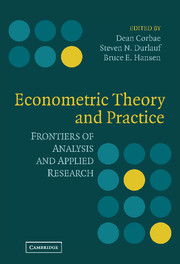Book contents
- Frontmatter
- Contents
- Preface: In Praise of a Remarkable Teacher
- Contributors
- Introduction
- PART I HIGHER-ORDER ASYMPTOTICS
- 1 Edgeworth Expansions for the Wald and GMM Statistics for Nonlinear Restrictions
- 2 Moment Selection and Bias Reduction for GMM in Conditionally Heteroskedastic Models
- PART II IV SPECIFICATION TESTS
- PART III NONSTATIONARITY
- PART IV LAD AND QUANTILE REGRESSION
- PART V NONSTATIONARY PANELS
- Index
2 - Moment Selection and Bias Reduction for GMM in Conditionally Heteroskedastic Models
Published online by Cambridge University Press: 05 June 2012
- Frontmatter
- Contents
- Preface: In Praise of a Remarkable Teacher
- Contributors
- Introduction
- PART I HIGHER-ORDER ASYMPTOTICS
- 1 Edgeworth Expansions for the Wald and GMM Statistics for Nonlinear Restrictions
- 2 Moment Selection and Bias Reduction for GMM in Conditionally Heteroskedastic Models
- PART II IV SPECIFICATION TESTS
- PART III NONSTATIONARITY
- PART IV LAD AND QUANTILE REGRESSION
- PART V NONSTATIONARY PANELS
- Index
Summary
INTRODUCTION
Generalized method of moments (GMM) estimators are one of the main tools for analyzing models of financial markets. Estimation of these models is often motivated by exploiting Euler equations for optimal investment and consumption decisions. This leads to a set of conditional moment restrictions that can be used to set up a GMM estimator. Rational expectations hypotheses imply that the estimation equation is augmented by an error that satisfies a martingale difference sequence property or, in other words, that is orthogonal to the information set of the agent.
Although the informational structure of rational choice models implies lack of correlation between the innovation and elements of the information set of the agent, it does not imply a particular structure for the correlation pattern of nonlinear functions of the innovations. In fact, an enormous empirical literature has documented correlations between squared residuals and other nonlinear functions of the innovation process.
In the context of GMM estimation, this lack of restrictions on the higher order moments of data and innovations complicates estimation of the optimal weight matrix and correct standard errors for the parameter estimates. Newey and West (1987), Andrews (1991), and Andrews and Monahan (1992) address the issue of consistent covariance matrix estimation in the presence of conditionally heteroskedastic and autocorrelated errors, whereas White (1980) considers the conditionally heteroskedastic case without autocorrelation. Andrews (1991) and Andrews and Monahan (1992) develop automated bandwidth selection procedures that minimize the asymptotic mean-squared error (MSE) of the estimated covariance matrix.
- Type
- Chapter
- Information
- Econometric Theory and PracticeFrontiers of Analysis and Applied Research, pp. 36 - 56Publisher: Cambridge University PressPrint publication year: 2006
- 2
- Cited by



